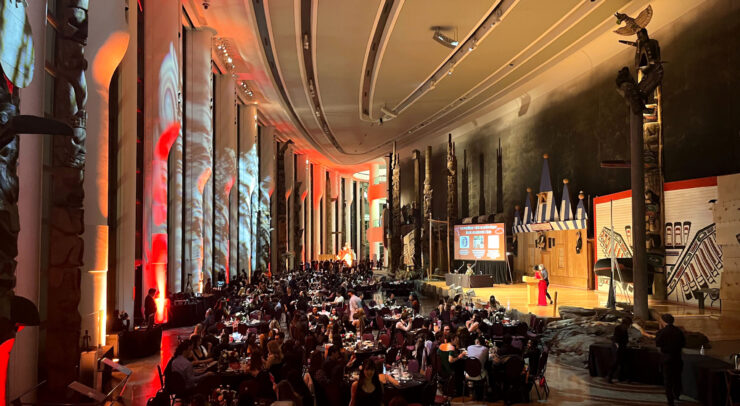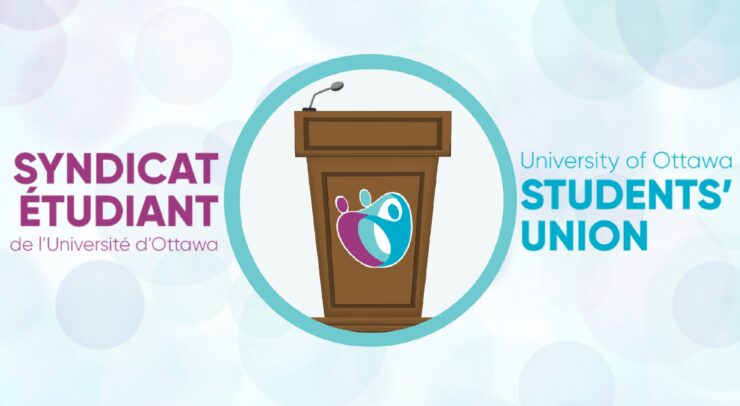Board votes to table motion outlining equity stances, rejects motion to shift dates of future meetings
As a General Assembly (GA) to decide whether an anti-abortion group will be able to access resources through the University of Ottawa Students’ Union (UOSU) approaches, the union amended their clubs code at a Board of Directors (BOD) meeting on Sunday.
A number of motions at the BOD meeting also failed to pass, including one outlining a number of the union’s equity stances and another to change the dates of board meetings. The UOSU created a full-time position for a human resources manager and also discussed a report on their first byelections.
Motion to change dates of BOD meetings fails
A motion brought by UOSU advocacy commissioner Sam Schroeder to change the meeting times of the BOD from Sundays to a rotation of weekdays failed.
The motion comes after a student criticized the union at its Oct. 27 BOD meeting for not accommodating students who mark Sunday as a religious day and might be unable to attend the board meetings.
Motion to create full-time position for human resources manager passes
Schroeder brought another motion to create a full-time position for a human resources manager who would report to the managing commissioners.
Schroeder said the union currently has no staff member completely devoted to human resources, which has caused confusion over responsibilities. Schroeder added that hiring for the position is within the union’s budget and the process would be led by the managing commissioners or the executive committee.
“There’s a benefit of having a position that’s separate from any … managerial position to handle human resources matters, because that power dynamic does influence the way folks feel when it comes to putting forward complaints,” said student life commissioner Jason Seguya.
The motion passed with one vote against.
Motion to form Student Coalition Committee is tabled
Faculty of social sciences director Babacar Faye brought a motion for the BOD to strike a Student Coalition Committee (SCC).
The SCC would be “an ad hoc committee with the purpose of centralizing efforts Ford’s policy, but it will also have a wider mandate in defending interests and anything that pertains to student causes,” said Faye.
Several members of the board and Ryan Pistorius, vice-president of the Common Law Student Society, raised concerns over some of the technicalities of the motion.
Pistorius and directors highlighted issues around the composition of the committee, who would have the authority to call meetings, and what quorum would be for those meetings. The board voted to table the motion so it could be fine-tuned.
Motions to adopt equity stances, two equity policies fail
The governance committee brought a motion for the union to adopt a slate of 14 equity stances, which ranged from a commitment to religious, spiritual, and cultural freedom to the official recognition of Black History Month in February.
The stances were developed by equity commissioner Judy El-Mohtadi in consultation with the equity representatives of recognized student governments and the coordinators of the UOSU’s equity service centres. An online feedback form was also used, El-Mohtadi added.
“I want it to be a book that binds us in terms of equity,” said El-Mohtadi. “Each stance is going to have a policy that shows how we apply that stance. It gives students the chance to hold us accountable to each stance we’re taking.”
Francophone affairs commissioner Natasha Roy took issue with the motion only being available in English and not in French, highlighting that one of the equity stances was a commitment to bilingualism and francophone representation.
“With this document only being presented in English, we’re not really respecting this,” said Roy, who proposed postponing the motion until the next BOD meeting in December.
Seguya said the hope was to have the motion passed at this meeting, along with the amendments to the clubs code, because of the GA taking place next month to decide whether the anti-abortion club will be able to access resources through the union.
“In the event that it’s not voted (on) or at least discussed at this meeting, it will have an impact on the (GA),” said Seguya. “These timelines were available at the beginning of the month.”
The concern over the motion not being bilingual sparked a broader discussion among the board as to when documents should be submitted by and who has the responsibility to translate documents.
“Whatever happens with this debate, the core of the complaint and the way to fix it is to establish a process through which people can have motions translated,” said faculty of social sciences director Tim Gulliver.
The board voted to table the motion until the next BOD meeting on Dec. 8.
Motions from the governance committee for the UOSU to adopt an anti-discrimination and accessibility policy also failed. They were tied to equity stances laid out in the tabled motion.

Amendments to UOSU’s clubs code pass
The final motion of the meeting from the governance committee proposed a number of amendments to the UOSU’s clubs code. The motion comes just a few weeks before a GA will be held to decide whether an anti-abortion group, U of O Students for Life (UOSFL), will be able to access resources and support through the union.
UOSFL was regranted preliminary club status last month, sparking a wave of backlash from students.
UOSFL was stripped of this status in November 2017 when the school’s former undergraduate student union, the Student Federation of the University of Ottawa, passed a motion blocking them from accessing resources, funding, and space on campus through the federation.
The UOSU voted unanimously to take a pro-choice stance on abortion at their Oct. 27 BOD meeting.
After 500 students signed a petition pushing for more action from the union, the UOSU set a special GA for Dec. 7 at their Nov. 14 BOD meeting to decide whether they will allow UOSFL to receive funding and support.
Under the first proposed amendment, the UOSU could withhold funding or resources to an organization if their activities meet a set of criteria in the eyes of the BOD or the GA.
An organization would fall within this criteria if their primary activities or mandate include advocating against access to legal abortion or advocating for discrimination under the Ontario Human Rights Code.
An entity would also be blocked from funding or resources if their activities promote “ableism, racism, sexism, homophobia, transphobia, anti-religious bigotry, or any other system(s) of oppression.”
The second amendment proposed that the UOSU could rescind or deny recognition of a club if the club’s activities are likely to be unlawful, violate U of O policies, constitute discrimination under the Ontario Human Rights Code, or impede legitimate, lawful activities of U of O students.
Club status could also be rescinded or denied if the club’s activities have “a substantially negative impact on a significant number of U of O students.”
Under the amendment, the UOSU could also withhold or rescind the recognition of a club if 500 students sign a petition outlining how the club in question is in violation of the criteria. At that point, an executive of the club in question and the creator of the petition would be asked to meet with the student life committee.
The club’s status could be denied or rescinded if at least three-quarters of the committee backs the decision. The decision could be overturned if either four-fifths of the BOD or the majority of a GA was in favour of doing so.
The motion passed unanimously with no abstentions.
BOD discusses report on first byelections
The meeting also saw discussions on a report on the union’s fall byelection, which was held from Nov. 6-8 and saw four new directors elected to the board and the equity commissioner position filled for the rest of the year.
The report, prepared by the chief electoral officer Jacques de Moissac and dated Nov. 13, says the byelection was “without controversy” and that “all the candidates followed the process well without too many hiccups.”
Turnout for the byelection was 6.8 per cent, lower than the UOSU’s first general election which saw about 16 per cent of eligible students vote.
“However, there is no need to be alarmed because a byelection usually has lower participation because fewer candidates put their names forward,” the report reads. “For the next election, I would like to do more non-partisan promotion to increase visibility and make sure more people vote.”
Board goes in-camera for undisclosed human resource discussions
The BOD went in-camera for about an hour to discuss a human resource-related matter. It is unclear what the discussion might have centred on, but advocacy commissioner Schroeder said in an interview on Nov. 21 that both the union’s general manager and director of services positions are now vacant.
Schroeder would not comment on whether the two former employees quit or were fired.
The UOSU’s BOD is set to meet next on Dec. 8, time and location to be announced. The UOSU will hold a special GA on Dec. 7 at 1 p.m. in the Marion Hall auditorium.
Read More:
- Anti-abortion group regains club status, sparking petition to reverse decision
- UOSU to hold General Assembly to decide club status of anti-abortion group
- UOSU announces results of fall byelections





